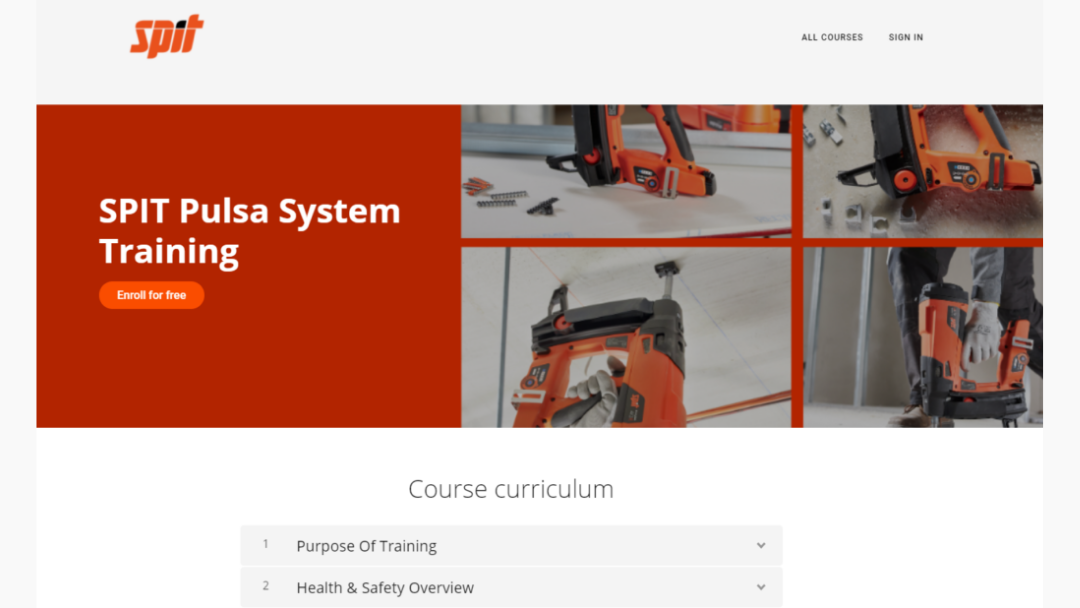How do you solve the issue of a skills shortage in the construction industry? It’s a question that stems from the recent Brexit debate and, due to an ageing workforce, attracting more young people into the industry. An article published by Clyde & Co reported that “with the UK already suffering from skills shortages and around 37% of London’s construction workforce coming from EU countries, project costs could be driven up, if the demand for labour outstrips supply” (1).
Coronavirus accelerates a need to switch to online training
The Coronavirus pandemic hasn’t eased the fears around a skills shortage, but it has highlighted a need for manufacturers and educators to adapt to offer support and services online, rather than in person.
Tool manufacturers such as SPIT have had to adapt their processes in line with the current environment. With the inability to go to site to do in person training they setup a training portal and have since revolutionised the way training is conducted – adding value for the tool operator and contractor.
To further highlight the cause for more key industry players to offer the flexibility of online training CEO of FIS, Iain McIlwee, had a conversation with the team at SPIT about the need for change.
Why is the flexibility of moving to an online training platform important for the industry?
IM: “I woke up to the potential of online learning nearly a decade ago when I was founding Director of a principally online training business. It opened my eyes to the efficiency and consistency that can be yielded. There are some practical things that it is difficult to relay and some people that need the physical experience, but for most of us, we can learn at our own speed, we can go back over bit if our concentration waivers and repeat as many times as we need for information to sink in or go back to it to remind ourselves what we have forgotten. It isn’t just about logistics and training around earning and life, it can actually enhance our training and learning experience.”
What do apprentices, professionals & contractors that you speak to expect to see from an online training platform to help them develop?
IM: “Simplicity is key. To be able to access with a range of devices, not everyone has a laptop or PC, but most have a smart phone. It is also helpful to have evidence that the training was completed, continuing professional development (CPD) logs and training records are key documents now.”
What is it about the SPIT online training that adds value to a tool operator and contractor?
IM: “The training is well pitched. It is practical, visual and it breaks the syllabus down into bite sized sections that don’t just teach you stuff, but do a good job in explaining why you need to know it. You can do it at your own pace, but equally you can’t rush through as you need to pass to progress. I like the combination of video, presentation and quiz, it flows well.”
Do you think that more manufacturers need to react to provide online training for construction professionals?
IM: “I think it is going to become increasingly important for manufacturers to support better their supply chain. We talk of Extended Producer Responsibility, but ultimately the question we should all be asking is how do we make it impossible to get it wrong?
Competency is probably the most important word in construction right now. How as an employer do you know that someone is competent and how do you do “all that is reasonable” to ensure that your workforce can work safely and deliver safety (this is your responsibility as a Director). There are some fundamental ingredients to competence, we use the acronym SAKE – Skill, Attitude, Knowledge and Experience. Knowledge based training is key to this and who better often than the manufacturer to impart this. So online training makes it easier, but the law both Health and Safety and Building Safety is making it ever more important and relevant.”
Is the future online or is there still a need for face-to-face training?
IM: “I don’t believe in a binary world, online training is brilliant and for all the reasons discussed is critical to how we develop competence in our teams, but there are always things that we can learn better face to face. My lad loves his football and he did loads of online training in the garden through lockdown, but is nowhere near as productive as a live situation where he is practicing and learning with others. I am also a firm believer that we spark off people, that iron sharpens so I don’t believe virtual can ever fully replace physical.”
You can find out more about the opportunities the FIS has to offer for support on training, apprenticeships and continual professional development here.
To find out more about the training opportunities available from SPIT, head to their training and certification page.
References


